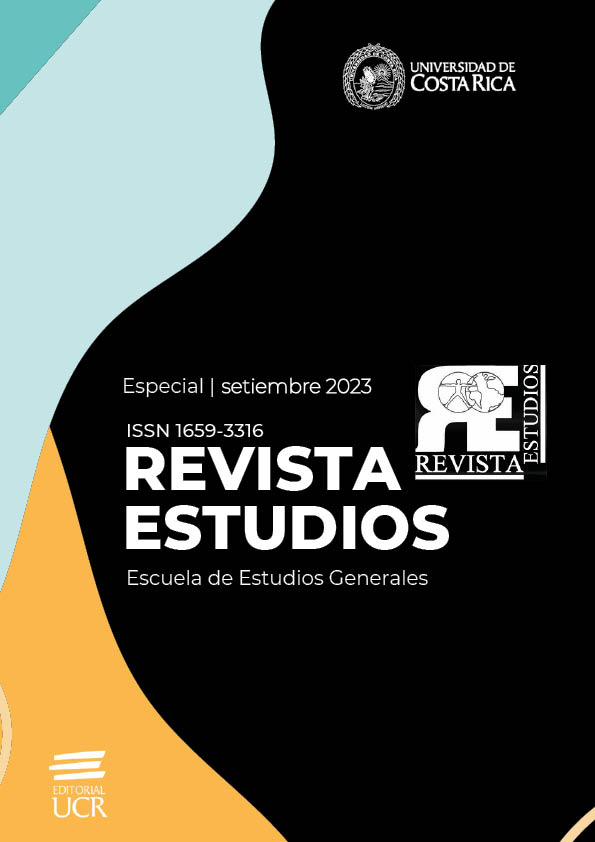Abstract
Eliot’s Four Quartets stands as one of the most influential poetic works of the 20th Century. Therefore, academics have approached it from many different angles, among which one may mention its musicality, the references it contains, its composition, and the belief systems that converge in it, such as Christianity, Hinduism, and Buddhism. Rap music, on the other hand, is generally assumed to be a cultural product that lacks profound insights on the subjects it touches upon precisely because it is built for entertainment, not academic analysis. However, although rap music is generally regarded as non-academic, Rafael Lechowski’s extensive rap work entitled Quarcissus: El arte de desamar has divided criticism because of the way in which it engages with the subject of emotional pain. This article argues that Lechowski’s work shares both structural and content features with Eliot’s Four Quartets; particulary regarding Buddhist principles, which is established by comparing the four sections that make up both texts.
References
Alridge, D. P., & Stewart, J. B. (2005). Introduction: Hip Hop in History: Past, Present, and Future. The Journal of African American History, 90(3), 190–195.
Bajželj, A. (2017). Middle Way (Buddhism). In: Sarao, K.T.S., Long, J.D. (eds) Buddhism and Jainism.
Encyclopedia of Indian Religions. Springer, Dordrecht. https://doi.org/10.1007/978-94-024-0852-2_280
Confino, J. & Huu, P. (2021, August 20). Lessons in Impermanence: How to Handle Life when Everything Changes |TWOII| Episode #2. [Video]. YouTube. https://youtu.be/fEfGe_O4EGI
Eliot, T.S. (1943). Four Quartets. HBJ Books.
Gokhale, P. P. (2021). Buddhist Approaches to Impermanence: Phenomenal and Naumenal. Religions, 12 (12), 1081. https://doi.org/10.3390/rel12121081
Keomahavong, N. (2022, March 3). How to Develop a Spiritual Environment – A Monk’s Guide. [Video]. YouTube. https://youtu.be/NlNIjcuQbIQ
Knap-Hay, E. (1987). T.S. Eliot’s Negative Way. Harvard University Press.
Lechowski. R. (n. d.). Biografía: dossier completo. Rafael Lechowski. https://www.rlechowski.com/galeria
Lechowski, R. (2019, January 29). Quarcissus: El arte de desamar (Obra completa). [Video]. YouTube. https://youtu.be/FJbUTRsn2g8
McLaren, J. (2007). Review of Passing and the Rise of the African American Novel; Charles Johnson’s Fiction; Rap Music and Street Consciousness, by M.
G. Fabi, W. R. Nash, & C. L. Keyes. Research in African Literatures, 38(3), 219–222.
Montezanti, M. (1994). El nudo coronado, estudio de Cuatro Cuartetos. Universidad Nacional de La Plata Press.
Nhat-Hanh, T. (1997). Stepping into Freedom; An Introduction to Buddhist Monastic Training. Parallax Press.
Nhat-Hanh, T. (1998). The Heart of the Buddha’s Teachings; Transforming Suffering into Peace, Joy, and Liberation. Broadway Books.
Nhat-Hanh, T. (2014). No Mud, No Lotus. Parallax Press.
Nukariya, K. (1913). The Religion of the Samurai: A Study of Zen Philosophy and Discipline in China and Japan. Temple of Earth Publishing.
Ruiz, F. (1968). Introducción a San Juan de la Cruz. La Editorial Católica.
Sosek, J. [Labyrinths]. (2021a, February 17). Introduction to Buddhism. [Video]. YouTube. https://youtu.be/YXiZpD3DY5I
Sosek, J. [Labyrinths]. (2021b, February 24). Introduction to Zen Buddhism. [Video]. YouTube. https://youtu.be/YXiZpD3DY5I
Sri, P.S. (1985). T.S. Eliot, Vedanta and Buddhism. University of British Columbia Press.
Suzuki, D.T. (1964). An Introduction to Zen Buddhism. Grove Press, Inc.
Tanner, J., Asbridge, M., & Wortley, S. (2009). Listening to Rap: Cultures of Crime, Cultures of Resistance. Social Forces, 88(2), 693–722.
Comments

This work is licensed under a Creative Commons Attribution-NonCommercial-ShareAlike 4.0 International License.
Copyright (c) 2023 Juan Carlos Saravia Vargas, José Roberto Saravia Vargas, Daniel Delgado Solano


